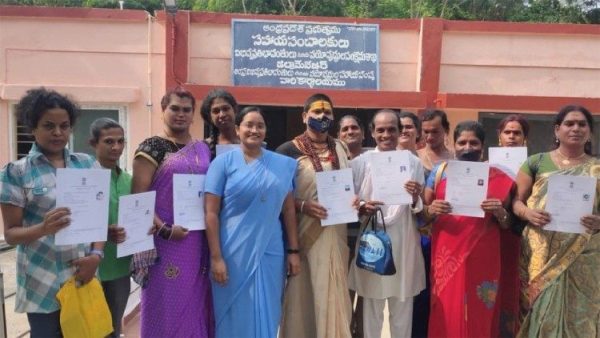India: Beyond every form of marginization
 Salvatorian Sister Amitha Polimetla has established the Nee Thodu Society, which seeks to provide outreach and acceptance for people pushed to the margins of Indian society.
Salvatorian Sister Amitha Polimetla has established the Nee Thodu Society, which seeks to provide outreach and acceptance for people pushed to the margins of Indian society.
They live by begging and prostitution, despised by everyone, even their parents, for being “different.” Who are they? Transgender people in the Indian state of Andhra Pradesh.
Salvatorian Sister Amitha Polimetla accompanies members of this blatantly marginalized community and fights for them to live in dignity.
'Transgender people in Andhra Pradesh are the most discriminated group in society,' explains the 39-year-old religious woman, who has worked with this community for several years. 'I don't think there is any other group of people who are ostracized by their own parents, ridiculed by siblings, abused by neighbours, and forced to leave their families of origin.'
More than an estimated half a million transgender people live on the subcontinent. Their existence has been attested in India's multifaceted culture for several centuries. Hijras they are called.
'As teenagers, they discover female behavior patterns. Sometimes family members or friends notice it first,' Sr. Amitha explains. Then their lives change. Exclusion begins immediately, and is radical, the sister notes. Even the school system does nothing for the transgender youths who are bullied by everyone.
'Rejected by their families, they run away in search of their identity, mainly migrating to the cities where they start begging and doing sex work. Why? Because that is the way it is in the transgender culture in our Indian society. They have no other way to earn a living.'
Sr. Amitha wrote her PhD thesis on transgender communities in Andhra Pradesh. But it was not until a few years ago that she had any idea who they were.
One day on the train to Bangalore, she noticed men dressed in women's clothes with makeup and trinkets begging and being aggressive.
'Everyone turned their heads away. No one wanted to look at them, talk to them, or even give them money. Then they touched the men to make them give them some money.' Their provocative appearance and behavior disturbed her.
After that, Sister sent out students to discover what was actually happening. They were told they were hijras, people who beg and prostitute themselves to survive.
'I was shocked. I started reading about them. One day, as I was coming out of my hostel, a trans woman walked straight towards me. I panicked, not knowing how to react. Out of fear, I just smiled and asked, ‘How are you?’ The woman started to cry and shared her story with me. That was the first time I really understood how discriminated against these people are, and how desperately they want to just be accepted.'
As a Salvatorian Sister, Amitha Polimetla is accustomed to think how she can heal and uplift people.
'Christ is always at the side of society’s marginalized: sinners, publicans, prostitutes, untouchables, the poor.'
She is convinced Jesus would not shy away from hijras since they live in an extreme existential periphery. In the port city Visakhapatnam, she and her fellow sisters established the Nee Thodu Society, a contact point for hijras.
Sr. Amitha also does outreach, seeking “to find out where they live and then go there. I talk to them and record their stories. I try to be a bridge between them, the Government, and their relatives. We are providing training for the transgender community, for parents and for the general public,' she explains.
Future plans include setting up a trans helpline, and providing a shelter.
India recognized transgender as a third gender in 2014. In 2020, the government began to issue ID cards.
Obtaining the National Transgender Certificate & Identity Card is key since it allows trans women to enroll in the state health system and access all other government assistance for which they are eligible, such as food ration cards, voter ID, pension allowance. But the road is difficult.
'Ninety percent of transgender persons do not have a school-leaving certificate because they are bullied out beforehand,' says Sr. Amitha. Many are illiterate and ignorant about their civil rights. 'We help them apply for their identity cards, which is complicated. We accompany them to the notary where they declare their transgender identity.'
The Salvatorian religious believes that condemning trans women for their non-conforming behavior is the wrong approach. They did not choose their natural orientation, but are forced to accept severe social stigmatization for it.
Certainly, the sister admits, the question of the third gender also poses questions for the Church. 'But the fact is that some children are born this way. We should accept them as they are, help them and support them, without trying to change them.”
Sr. Amitha Polimetla SDS, Nee Thodu Society (Photo Credit: The Nee Thodu Society for transgender persons)
At the same time, the non-participation of trans people in society is deeply unjust from a Christian perspective, Sr. Amitha maintains.
'There are people with this kind of orientation, with this kind of hormonal imbalance or chromosomal imbalance. How many more years can we ignore them in this way? It is time we accept these people as they are and help them with our resources so they can live a dignified life in this society.'
Gudrun Sailer
Source: vaticannews.va
